- Home
- Rose Tremain
The Road Home Page 5
The Road Home Read online
Page 5
“But she will see Princess Diana,” Lev told himself now. He could imagine Ina propping up the card at the back of her workbench and letting the white paraffin light illuminate the rose-blushed skin and the hesitant smile, then sitting back in her chair to gaze at these lost things and at the fascinating intricacy of the diamond tiara. And Maya would come into the cabin sometimes and stare at Diana, too. And once in a while—not often—the two of them might turn the card around to reread the words he’d written: I am going to find a job today.
Lev picked up his bag and heard the bottles clank. He cursed himself for daydreaming. Daydreaming may have been all right during the lunch hour at the Baryn lumber yard, but you couldn’t daydream and survive in cities like Glic or Jor, let alone in London. “Cities are fucking circuses,” Rudi once remarked, “and people like you and me are the dancing bears. So dance on, comrade, dance on, or feel the whip.”
The heat was rising again. You could feel it coming off the stained pavement, see it shimmering above the cars. Lev prided himself on being strong—a strong, lean-limbed man—but now he felt himself begin to stagger. Sweat ran down his forehead. The other people in the street started to look grotesque to him, fat and mocking and sick. He’d somehow naively imagined that most English people would look something like Alec Guinness in Bridge on the River Kwai, thin and quizzical, with startled eyes; or like Margaret Thatcher, hurrying along with purpose, like an indigo bird. But now, in this place, they appeared indolent and ugly and their heads were shaved or their hair was dyed, and many of them sucked cans of cola as they walked, like anxious babies, and Lev thought that something catastrophic had happened to them—something nobody mentioned but which was there in their faces and in the clumsy, slouching way they moved.
Lev walked into a cool, brightly lit place called Ahmed’s Kebabs. An Arab man was cleaning the tiled floor with bleach. Behind a counter, a gray cone of meat revolved on a perpendicular grill. A chill cabinet had been stocked with torn lettuce, chopped tomatoes, and breads of different kinds. A large glass-fronted fridge was filled with cans of cold drinks.
Lev put down his bag, and the Arab man turned and looked at him while he squeezed out his mop.
“Excuse me,” said Lev. “Do you have anything to give me?”
The Arab man picked up the bucket and mop and took it behind the counter. Then he turned and examined Lev. His eyes were worried and wild, and his hair was glossy and disorderly, like Rudi’s.
“Sit down,” he said.
Against the counter were lined up three chrome-and-plastic stools, so Lev hoisted himself onto one of these and rested his arms on the cool countertop. The Arab man set down a paper plate. He took a floury bread pocket from the chill cabinet and filled it with some of the torn lettuce. Then he walked to the meat cone and deftly shaved off a few slices and put these into the pocket and set it down in front of Lev on the paper plate. Lev stared at it. The meat smelled of goat.
The Arab was at the drinks refrigerator now. He took out a greencolored can, snapped open the ring pull, and put it beside the plate with the bread and meat. “Drink,” he said.
Lev thanked the man and slowly pulled the can toward him. With his other hand, he wiped the sweat off his forehead. Then he lifted the can to his mouth and drank, and the Arab man watched him intently. The water was fizzy and felt almost scratchy on Lev’s tongue, but it was beautifully cool, so he kept drinking, and as he drank he remembered Marina begging for water that was cold and had no taste, then crying with rage and saying that hospital water was tepid and tasted of the sewer.
“I am Ahmed,” said the Arab man. “Please eat. On the house.”
“Excuse me?” said Lev.
“You ask if there was anything I could give you. Well, I give you this food and water. Where you from? Eastern Europe somewhere, uhn? So eat. My kebab meat is very good. And for you it is free.”
Free.
Lev knew this word very well. His English teacher had explained to him that the West described itself as the “Free World” and these words had fascinated him across months and months of time. But how was one supposed to imagine this freedom? In Lev’s dreams, it had often become a black road, laid straight and true to a flat horizon, where a few birds looped and turned against a white sky, but there was something austere and unforgiving about this landscape, so he’d said to Rudi, “I don’t know what it really means,” and Rudi had replied, “You don’t know, Lev, because you’ve put no vehicles on the fucking road! Freedom is speed. Freedom is horsepower and torque. Freedom is four wheels under your arse.”
Lev thanked Ahmed again for the free food and water. He tried to eat the kebab thing, but gave up after one mouthful. He longed to smoke, but his last two packs of cigarettes were deep in his bag and he was too embarrassed to start searching for them.
“So,” said Ahmed, “you want work? What work do you want?”
“Any work,” said Lev.
“Well,” said Ahmed. “You are lucky. You came to the right place, because I am a Muslim.”
“Yes?” said Lev.
“The Koran teaches that deeds of unselfish kindness will be rewarded in Heaven. I’ve given you precious food, and for this unselfishness, I will find reward. But now I shall go further. I am going to give you work.”
Lev waited. He wasn’t sure how much he’d understood. Ahmed asked him his name and what city he’d come from and Lev told him and Ahmed smiled and said, “A man may travel far, but his heart may be slow to catch up.”
“Sorry?” said Lev.
“Take no notice. I like to invent proverbs.” Ahmed’s smile turned into a wide grin, then into laughter, and the laughter echoed all around the tiled and empty surfaces, and Lev thought, suddenly, He’s playing games with me, and the food and water will not be free. Then Ahmed disappeared through a plastic fly curtain, very like the one Ina hung from her door lintel in summer, all colors, but faded with sunshine and time, and Lev found himself alone. He went to his bag and, with hands that shook, rummaged about until he found the cigarettes, then tore open the packet and lit up, using the plastic lighter he’d almost given to the Sikh washroom attendant at the station. He inhaled deeply, loving that first pull, feeling the smoke begin to steady him as he went back to the plastic seat and waited. He sat very still, smoking with concentration. The goat meat kept turning on its automatic spit. In a mirrored surface near it, Lev could see the street behind him and the slow traffic and the heavy-bellied people slouching past.
A long time seemed to pass before Ahmed returned. Onto the countertop he put a tall cardboard box containing an overflowing pile of black-and-white leaflets, on which the name Ahmed’s Kebabs was written in twirly, backward-sloping script. Ahmed banged his fist down proudly onto the pile. “Your work,” he said. “Deliver leaflets. Okay?”
“Yes?”
“Yes. All round this neighborhood. Everything residential. Smart houses. Shabby houses. Flats. B&Bs. Every private door. Check the basements especially. Many kebab people live in basements. Don’t bother with the hotels. Every leaflet you post in, I pay you two pence. Ten houses, twenty pence. A hundred houses, two pounds. Perhaps you are a godless man, Lev, but today Allah has smiled on you. Eh?”
There was the question of the bag.
Because it contained everything Lev owned, he didn’t want to be parted from it, but he knew he wouldn’t be able to walk from house to house encumbered by it. He considered hoisting it onto his back, sticking his arms through the two handles, but he saw how it would weigh him down, so Lev told himself calmly to trust Ahmed and leave the bag with him and not think about it, because the things it contained were valueless, except to him.
Before setting off, Lev forced himself to eat a few mouthfuls of the goat sandwich. Something would have to sustain him through the hours that lay ahead, when the heat of midday would arrive and he would be lost in this heat, lost in the labyrinth of gray streets. But he felt cheerful all the same. On this job, he wouldn’t be required to speak or to u
nderstand other people speaking to him. He’d be alone again with his own familiar reveries.
Ahmed put half the leaflets into a plastic carrier bag and handed this to Lev. Lev was unable to judge how many leaflets were in the bag, but it was heavy and he could tell that the plastic was going to bite into his hands. He wished he had with him the little canvas satchel he used to carry to school long ago, when the school in Auror still had its iron bell and eagles could be seen in the hills above. He found himself wondering what had become of the bell and what had become of the eagles, but knew the timing of these thoughts was somehow inappropriate and that they had to be banished. “Most things disappear,” Lev heard Rudi say. “Just make fucking sure some of them disappear into your own pocket.”
He walked out into the sunshine. He passed a flower stall filled with roses, lilies, and cornflowers, and the scent of these, in the heart of the city, surprised Lev, as though he’d imagined flowers only gave off any perfume when the air was silent.
He knew he should begin straightaway delivering the leaflets, so he turned off the busy Earls Court Road and found himself in a street of tall houses, not unlike the one he’d imagined inhabited by the immigrants making vodka out of potatoes, except that there was a solid kind of grandeur about the buildings he hadn’t quite anticipated. Some of them were smart, with newly painted railings round them and fat pillars shining white or cream in the hot day; others looked neglected, almost broken-down, with cracks in the window ledges and garbage bags dumped on the front steps, and Lev saw that this cohabitation of restored and dilapidated things was everywhere he looked, and he found this consoling, as though, at last, he’d found some evidence of war damage in London that no one had been able to erase.
He took out a handful of Ahmed’s leaflets and put them through the letterbox of the first house. Under Ahmed’s Kebabs were written the words Best Luxury Halal Meat; Best Prices In Your Area; Eat In Or Take Away; Friendly Service At All Times, but only some of these words had any meaning for Lev. “Best” he knew was an important concept, one seldom alluded to in his country, except by people like Rudi, who yearned to adorn himself with marvels, so that even his boots had to be worthy of admiration and his shaving balm possess powers of seduction over men and women alike. “Friendly Service” Lev saw as a contradiction, remembering the few restaurants he’d ever visited in his country, in the days when Marina was alive and he’d wanted to show her how much he prized her by offering her a nice dinner. The waiters and waitresses had behaved like labor-camp guards, slamming down dishes of sinewy meat, sloshing out wine from dirty carafes, snatching their plates away before their meal was finished . . .
“Why don’t any of you smile?” Marina had once asked a surly waiter in a stained apron. And the boy—for he was a boy really and not yet a man—had looked at her, astonished.
“To smile at the customers wouldn’t cost you anything,” Marina had continued gently, but the boy had looked away.
“You’re wrong,” he said. “To smile would cost us our dignity.”
And after he’d hurried back to the kitchen, stamp-stamp-stamp in his heavy shoes, carrying the plates and the glasses and the empty carafe on a tilting tray, Marina had taken Lev’s hand and said, “Now I feel pity for the boy. Before, I felt fury and now I feel pity and I was happier with the fury!”
Marina.
It was important not to start thinking about her now. It was essential to Lev’s survival not to lose himself in dreams of her.
He descended some steps into a basement area and found, almost hidden under the pavement, a tiny garden planted with bay trees and lavender and big hydrangea bushes, struggling toward the light. A tabby cat lay curled on the low windowsill of the basement flat and barely opened an eye as Lev took out a few more leaflets and put them through the brightly painted yellow door. Next to the yellow door was a bell, with two names above: Kowalski and Shepard. Lev stood for a moment looking at these names and at the yellow door, and then at the garden, which had been made out of very few things but which was so beautiful in its small way that envy of these people, Kowalski and Shepard, stabbed at him suddenly with surprising force. He imagined them returning from their well-paid jobs, watering their plants, feeding the cat, ordering kebabs from Ahmed, buying wine or vodka, sitting close together at their table, eating and laughing and smoking, then going hand in hand into their bedroom as the night came down. And he thought, My life will never be like theirs. Never.
Lev walked on. The weight of the leaflets in the carrier bag became lighter as he completed the first three streets and came into a quiet square, where children played on a rough lawn, safe behind railings, and where the air was scented with privet. He was in a trance of delivery now: walk up the front steps, grab the leaflets, hurl them through the letterbox, walk down the front steps, go down again into the basement, examine the number of names, select the right number of leaflets, throw them in, climb back into the sunlight of the street, pass on to the next house . . . His legs ached a little, he wore his leather cap low, against the midday glare, but he wasn’t unhappy with his task. Before long, he calculated that he’d earned £1.
Lev rested for a while, leaning on the gate that opened on the square garden, watching the children on some swings and their young mothers, dressed in tight little vests and jeans, lounging on the grass in the shade of a mulberry tree. He lit a cigarette and it tasted good, and the scent of privet seemed to be drawn with the smoke into his lungs, and there was something in this combination that made Lev feel alert and fearless, and he thought that when the night came he’d return here and sleep under the mulberry and watch the life that was going on in the houses all around him and in this way acquire a new vision of London—a secret vision. And this cheered him, that he’d chosen a place to sleep, somewhere free, somewhere secret, a place where he could keep watch . . .
But now Lev saw that the young mothers had turned and were all staring at him and then whispering together. He looked down. He kept the cigarette cupped in his palm. One of the women got up and began marching toward him. He looked at her from under the peak of his cap. She was pale and pretty, with freckled arms, and she arrived very close to him, so that he could smell her sun lotion.
“This is a private garden,” she said.
“Yes?” said Lev.
“Yes. This is a garden for residents only. So can you . . . go away, please?”
Lev looked beyond the young woman to her group of friends, and he saw that they’d called the children from the swings and had their arms round them and he understood that they thought him a criminal of the kind who was bullied and ostracized at the Yarbl Institute of Correction and of whom society didn’t wish to speak.
“You are thinking . . .” he began, then stopped. He ran short of words, but felt that, even if he’d known the words, he couldn’t have brought himself to say them about himself. The freckled young woman stood confronting him with her hands on her hips. Lev wanted to say to her that he had a daughter the age of the children in the garden, that even now Maya would be walking home from school with her small satchel and her worn shoes . . .
“Okay?” said the young woman. “You’re leaving now. Right?”
Lev shook his head, trying to show her that she’d read him wrong, that he was a good man, a loving father, but this shaking of his head alarmed the woman and she called to her friends, “He’s not going. Someone call the police.”
“No,” said Lev. “No police . . .”
“Then leave.”
“I am new,” said Lev. “I am only looking my way through many streets.”
The woman sighed, as one of her friends joined her. “Nutter,” she said. “Foreign nutter. Probably harmless.”
“Okay,” said the friend, approaching Lev. “Pissez-off, right? Comprendo?”
By late afternoon, and with all the leaflets delivered, hunger and thirst began to torment Lev. He thought longingly of Lydia’s hard-boiled eggs.
He knew he was lost now. He wished he
’d left a trail of leaflets to guide him back the way he’d come. He stood and looked around him, staring left and right, left and right. Then he set off again, trying to remember what route he’d followed.
When at last he reached Ahmed’s kebab shop, it was crowded with a group of Arab men eating meat in the bread pouches and drinking coffee from paper cups. The smell of the goat meat now seemed almost perfumed and sweet to Lev, and he made his way to Ahmed’s counter and put down the empty bag.
“Leaflets gone,” he said.
Ahmed’s back was turned to Lev. He was carving meat from the cone, sweat gleaming on his arms.
“What I hope, my friend,” Ahmed said after a moment, “is that you put every one through a letterbox. I have had workers who dump my leaflets in the fucking trash and then ask me for money, and although I am a very kind Muslim, that makes me hopping.”
Around him, the Arab men began laughing.
Were they laughing about “hopping”? Lev recalled his English teacher saying, “In a foreign language meaning sometimes arrives a little while after the words have been spoken.”
Ahmed began filling three bread pockets with meat and salad. He set these on the counter for his Arab friends and then moved away to his coffee machine. All Lev could glean by way of meaning was that Ahmed’s mood had changed since the morning. He watched him serve the coffee and take money and put this into his sophisticated cash register, which had no ringing bell like cash registers in Lev’s country, but made only a quiet little buzzing sound of appreciation as its drawer opened to receive the notes. Lev stared at the cash register. He saw Ahmed’s wide hand poised above it, and after a moment’s hesitation, the hand snatched out a green note and closed the drawer. Ahmed crossed over to where Lev stood. He put the note down on the counter.

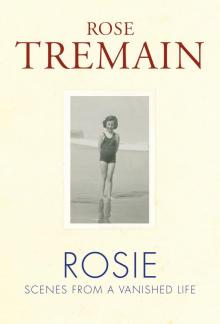 Rosie
Rosie The Garden of the Villa Mollini
The Garden of the Villa Mollini Merivel: A Man of His Time
Merivel: A Man of His Time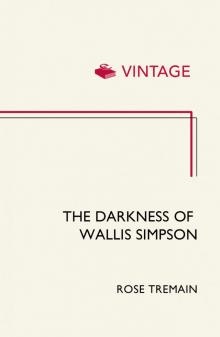 The Darkness of Wallis Simpson
The Darkness of Wallis Simpson Earth
Earth Sacred Country
Sacred Country The Swimming Pool Season
The Swimming Pool Season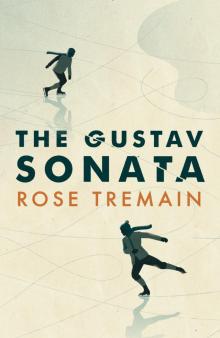 The Gustav Sonata
The Gustav Sonata Sadler's Birthday
Sadler's Birthday The Cupboard
The Cupboard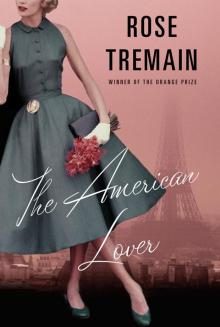 The American Lover
The American Lover Letter to Sister Benedicta
Letter to Sister Benedicta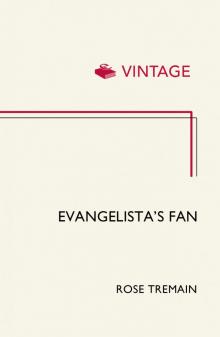 Evangelista's Fan
Evangelista's Fan Restoration
Restoration The Road Home
The Road Home The Colonel's Daughter
The Colonel's Daughter The Way I Found Her
The Way I Found Her Music & Silence
Music & Silence